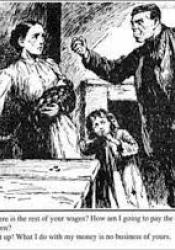Coverture in 19th Century England
A reading or viewing of Jane Eyre is grossly incomplete without a legitimate attempt at understanding the aspects of coverture. Coverture's existence in 19th century England was nothing short of financially, socially, and religiously damning for women's gendered status. This legal doctrine, as explained by author Margot Finn in their article, "Women, Consumption and Coverture in England c. 1760-1860" explains how coverture "subsumed a married woman's legal and financial identity under that of her husband" (Finn) and essentially removed women from the legal perspective. The doctrine worked hand-in- hand with the social attitudes at the time to produce a hyper misogynistic society, ultimately resulting in a lower class status for women. The results of the doctrine are felt in totality throughout the tale of Jane Eyre as Jane is consistently placed in social situations in which she has been stripped in entirety of her power, dignity and often her humanity. While through the first portion of the text she has been single/ unwed, Jane has had to seek her own terms of employment due to the lack of financial resources she has acquired as a woman during this time. Coverture is not necessarily a singular legislative piece that had an instantaneous impact on the novel, but rather an overwhelming shadow presented over the entire story which seeps into every interaction Jane experiences. Coverture’s reach is both wide and ominous while poisoning the ability for Jane to pursue any sort of social mobility.

